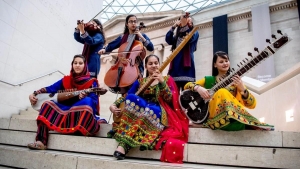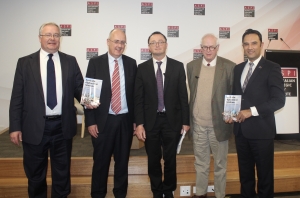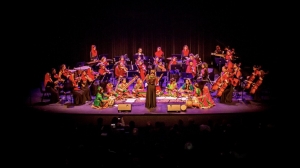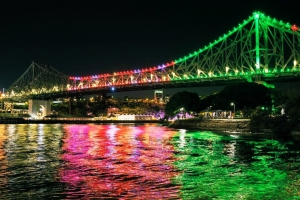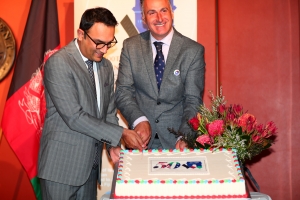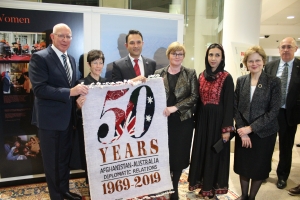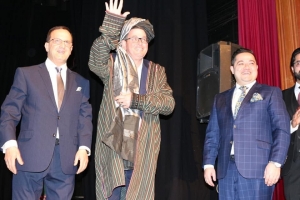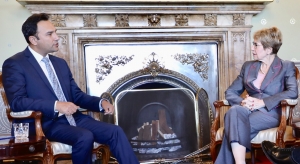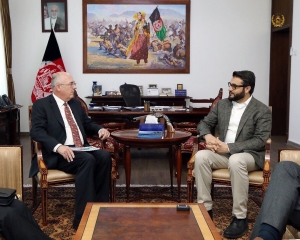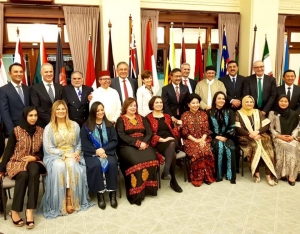The Embassy of the Islamic Republic of Afghanistan is proud to announce the upcoming Zohra Orchestra performance, in celebration of 50 Years of Afghan-Australian bilateral relations and the 100thAnniversary of Afghanistan’s Reclamation of Independence. As part of their debut Australian tour, the Afghanistan National Institute of Music’s Zohra Orchestra will be showcasing two major performances in Melbourne at Monash University on the 12thof October, and at the Sydney Opera House on the 14thof October.
This tour is giving Australian and Afghans alike the rare opportunity to witness Afghanistan’s first all-female, internationally acclaimed orchestra. These 75 brave young women are students of Afghanistan’s only music school, defying the odds to attain an education and play music together, allowing them to explore their culture and identities as artists and as women. Since embarking on their first international tour in 2017, Zohra have garnered a substantial amount of praise and attention from critics and spectators across the globe, as well as awards including the Freemuse Award and Success for Women of Afghanistan from the Institute for Peace, Media, and Good Governance in 2017. Later in 2018, they were conferred with the Montluc Resistance Liberte Award.Their distinctive sound is based on a harmonious blend of classical Afghan and Western instruments in a manner that simultaneously generates cultural harmonies and showcases the nuances of traditional Afghan music.
Organised by the Embassy of the Islamic Republic of Afghanistan in cooperation with the Government of Australia and the Government of New South Wales, Zohra Orchestra’s tour to Australia aims to raise cultural engagement and people-to-people links between the two countries, and enhance people-to-people links in celebration of 50 years of this relationship. It will provide audiences with the opportunity to attain an extremely unique musical experience, whilst simultaneously showcasing the resilience and determination of Afghan youth and women to continue fighting for their rights and carry their country from strength to strength, and their dedication to ensuring that extremism has no place in Afghanistan.
Registration is essential and can be made at www.afghanaustralia.com.au. The Embassy looks forwarding to welcoming all attendees to this iconic event at Monash University on the 12thof October, and Sydney Opera House on the 14thof October to celebrate the two important milestones of 2019.
It is now fifty years since diplomatic relations were formally established between the Commonwealth of Australia and the Kingdom of Afghanistan. Superficially, the two countries might seem to have little in common.
Nonetheless, there is more to unite Australians and Afghans than one might think at first glance. Even before the Australian colonies federated, Afghans made their way to Australia to provide transport by camel in Australia’s inland. By the time of the 2016 census 46,800 Afghans were living in Australia. And since 2001, more than 25,000 members of the Australian Defence Force have served in Afghanistan. Recent years have brought Australia and Afghanistan far closer to each other than ever before in their history.
Professor William Maley explores some of the key dimensions of the development of this relationship. Since 2001, the state-to-state relationship has developed additional dimensions – diplomatic, military, developmental, and humanitarian – which have been augmented by significant people-to-people ties despite all the difficulties that surround travel between the two countries.
Yet for all this, what ultimately binds the two countries together is that Australia has a strong interest in seeing the transition in Afghanistan that was inaugurated in 2001 – a complex mixture of statebuilding, institutional development, economic change, civil society activism, and enhancement of human rights and freedoms – continue down the broad path that was laid out at that time. A failure in Afghanistan is likely to involve serious adverse strategic consequences for Australia.
To access this book, please click here.
To Celebrate Centenary of Reclamation of Afghanistan’s Independence and 50 Years of Diplomacy between Afghanistan and Australia
In celebration of 100th Anniversary of Afghanistan’s Reclamation of Independence and the 50 Year Anniversary of Afghanistan-Australia Diplomatic Relations, the Afghanistan National Institute of Music’s Zohra Orchestra will be showcasing two major performances at Melbourne & Sydney’s iconic landmarks as part of their debut Australian tour.
Saturday 12th October 2019, Robert Blackwood Hall, Monash University, Melbourne
Monday 14th October 2019, Sydney Opera House, Sydney
This tour is giving Australians the rare opportunity to witness Afghanistan’s first all-female, internationally acclaimed orchestra as they are led by the country’s first ever female conductor. As students of Afghanistan’s only music school, these seventy-five brave young women are defying the odds to attain an education and play music together, allowing them to explore their culture and identities as artists and as women.
Their distinctive sound is based on a harmonious blend of classical Afghan and Western instruments in a manner that simultaneously generates cultural harmonies and showcases the nuances of traditional Afghan music. Since embarking on their first international tour in 2017, Zohra Orchestra have garnered substantial praise and attention from critics and spectators across the globe, in addition to several awards. To learn more about Zohra Orchestra, click here.
Initiated and led by the Embassy of the Islamic Republic of Afghanistan in cooperation with the Government of Australia and the Government of New South Wales, Zohra Orchestra’s tour to Australia aims to raise cultural engagement and engagement between the two countries, and enhance people-to-people links in celebration of 50 years of this relationship. “This 50th Anniversary is an opportunity to reaffirm Australia’s support to Afghanistan, particularly as the peace process continues and we go forward into the next 50 years of this bilateral relationship, focusing on women’s empowerment and role in society” – His Excellency General the Honourable David Hurley AC DSC (Retd), Governor General of Australia
“Zohra Orchestra’s Australian tour provides audiences with the opportunity to attain an extremely unique musical experience, whilst simultaneously supporting the development of people-to-people and cultural links between Australia and Afghanistan. It is a showcase of the resilience and determination of Afghan youth and women to continue fighting for their rights and carry their country from strength to strength” – H. E. Wahidullah Waissi, Ambassador of the Islamic Republic of Afghanistan to Australia
APPROVED MEDIA IMAGES DOWNLOAD HERE.
For further information and to book please visit www.afghanaustralia.com.au
For media enquiries and further information, please contact Nikolas O’Meara on This email address is being protected from spambots. You need JavaScript enabled to view it. or call 0414 497 791.
Brisbane, 19 August 2019 - The Queensland Afghan Community Association (QACA) in collaboration with the Embassy of the Islamic Republic of Afghanistan in Canberra celebrated 100thAnniversary of Afghanistan`s Reclamation of Independence and 50 years of diplomatic relations between Australia and Afghanistan in Brisbane on 19thAugust 2019.
The commemoration was attended by a large number of Afghan community members and some Australian local officials.
Dr Rashid Mohmood, QACA President welcomed the participants and thanked Australian government for hosting Afghan communities and for assisting the people of Afghanistan in various spheres, particularly in the area of empowering women and girls and people to people bonds.
Mr. Mostainbillah Balagh, Embassy counsellor conveyed the message of HE Wahidullah Waissi, Ambassador of the Islamic Republic of Afghanistan in Canberra, on the two aforementioned historic occasions.
In the message, preservation of Afghanistan’s freedom inherited by the Afghan brave ancestors, in particular the reformist King Amanullah who gained Afghanistan’s independence in 1919 were highlighted as the responsibility of all Afghans either inside or outside of the country. The message also reflected on the shared history, endurance and future potential of long- lasting friendship between Afghanistan and Australia.
Hon Stirling Hinchliffe MP, Minister for local Governance, Minister for Racing and Multicultural Affairs of Queensland who was the special guest in the festivity praised the friendly and diverse relations between Australia and Afghanistan from diplomatic engagements to development and defence cooperation, cultural ties and sport.
The marvellous evening gathering continued with various activities including music performance, poetry, Afghan traditional cuisine and lighting up the iconic Brisbane story bridge with the colors of the Afghan flag sponsored by the Brisbane City Council.
The festive event concluded with an award- giving ceremony being presented by the Embassy counsellor to key organizers of the event.
Sydney, 19 August 2019 - The 19thof August 2019 marked the 100thAnniversary of Afghanistan’s Reclamation of Independence and was celebrated in Sydney at the NSW Parliament. This celebration was part of a series of events taking place across Australia, New Zealand and Fiji to honour this important milestone, alongside the 50thAnniversary of Afghan-Australian diplomatic relations.
The Embassy of the I.R. of Afghanistan was pleased to organise the event in Sydney. The event was attended by numerous leaders and members of the Afghan community, friends of Afghanistan and Australian state officials, including representative of the office of Ms Gladys Berejiklian, Premier of NSW, Mr Anthony John Sidoti, who is the NSW Minister for Sport, Multiculturalism, Seniors and Veterans.
NSW Parliament House recognised the anniversary by hoisting the Afghan flag, and the official events began with all guests joining to recognise the victims of the abhorrent terrorist attack in Kabul on Saturday the 17thof August.
The Embassy wishes to express its appreciation to all guests of the event and the ongoing support of Afghan communities in NSW to the Embassy, and their contribution to the promotion of bilateral relations and the mutual friendship between Afghanistan and Australia. It also extends its thanks to the staff of NSW Parliament house for their assistance in making the event a success.
This 100thAnniversary of Independence and 50thanniversary of diplomatic relations draws attention to the ongoing efforts of Australia and its people to promote peace and security in Afghanistan, the contributions of Afghan-Australians who have made Australia their home, and the spirit of mutual
support that binds them together. We each look forward to a future of lasting stability and security as we move forward into what the next 50 years will bring for the Afghan-Australian bilateral relationship, and the next 100 years of Afghan independence.
Canberra, 15 August 2019 - This month, the Islamic Republic of Afghanistan marked its 100thAnniversary of Independence and 50 Years of Diplomatic Relations, featuring 9 events throughout 8 cities in 3 countries.
In Canberra, over 200 guests attended an evening reception featuring the opening of an Afghan photographic exhibition and remarks from the Ambassador, the Australian Minister for Defence and the Secretary of the Australian Department of Foreign Affairs and Trade.
In his remarks, Ambassador Waissi reflected upon the unique bonds shared between Afghans and Australians through military cooperation; socio-economic development, and people-to-people exchanges.
Ambassador Waissi stated that the foundation of the Afghan-Australian relationship began when the first Afghan cameleers arrived on the Australian continent over 150 years ago. From there, they went on to contribute to the development of inland trade routes and became integral in shaping the Australian outback. Although they no longer exist in modern Australia, their lives and experiences lived on through the kinships formed with Indigenous Australians; and through the passenger train which travels between Adelaide and Darwin known as The Ghan.
Following this, Ambassador Waissi reflected on past milestones in the Afghan-Australian relationship: the appointment of Australia’s first Ambassador to Afghanistan in 1969, the vice-versa appointment of Afghanistan’s first Ambassador to Australia in 1975, the first visit to Afghanistan by the Australian Governor-General, and the efforts to eradicate the threat of International terrorism and extremism following the tragic terrorist attacks against the United States on 11thSeptember 2001.
“It wasn’t until the tragic terrorist attacks against the United States on 11thof September 2001 that saw our strongest challenge in the face of adversity. Our relationship entered a new dimension after Australia committed over 25,000 Australian men and women over two decades, to support Afghan military forces eradicate the threat of International terrorism and extremism”.
The 50thAnniversary proved to be more than an opportunity to reflect on the past. Ambassador Waissi expressed his sincere gratitude to all the brave Australia service personnel and their families for their sacrifice, including 42 service personnel who made the ultimate sacrifice in the ongoing pursuit of peace.
“On behalf of the Afghan people and the Government of Afghanistan, I offer my deepest respect and admiration to your valiant hearts”.
Ambassador Waissi also reaffirmed that Australia continued to remain a staunch friend in difficult times, highlighting the recent contribution of 270 Australian Defence Force personnel to support the NATO-led Resolute Support Mission in Kabul. Furthermore, he commended Australia’s commitment in providing an additional $82.1 million in Overseas Development Assistance to preserve and ensure steady gains in: economic growth; effective and accountable governance; empowering women and girls, and; building resilience and supporting at-risk populations.
Concluding his remarks, Ambassador Waissi noted that as Afghanistan undergoes a critical transition toward a new era of peace and prosperity, it was important to recognise the people-to-people exchanges that strengthened the bond in Afghan-Australian Relations with little to no recognition.
“Afghanistan’s landlinked nature and isolation from the world has exemplified several unique challenges. Yet, through enhancements in global connectivity and cross-cultural exchange, we see a new generation of Afghans and Australians alike conducting business and strengthening a shared future”
As a token of gratitude, Ambassador Waissi presented the Governor-General of Australia with an Afghan Carpet symbolising our shared history, reflecting present arrangements and expressing optimism for future generations to come.
To view Ambassador Waissi’s full remarks, please click here.
On the 19thof August 2019, Afghan communities residing in Melbourne gathered for the celebration of the 100th anniversary of Afghanistan’s reclamation of independence and the 50th anniversary of the establishment of diplomatic relations between Afghanistan and Australia. This was part of a series of events taking place across Australia, New Zealand and Fiji to commemorate both of these important anniversaries.
The event, held at Springvale Town Hall, was organised by the Afghan community in Victoria, in particular Mr Dur Mohammad Ashna and Mr Basir Qadiri, and was funded by Mr Alande Mustafa Safi, President of Paragon Business Group based in Victoria.
The gathering was well received and those who attended included Mr Daniel Andrews, Premier of Victoria, who took the opportunity to congratulate all Afghans on Independence Day and praised the contributions of Australian-Afghans to Australia's development and rich multiculturalism. Also in attendance were Mr Luke Donnellan, Victorian MLA for Narre Warren and Mr Steve Dimopoulos, Victorian Member of Parliament for Oakleigh.
Other attendees who joined in the celebration were state officials, leaders and members of the Afghan community, and many Afghans living in Melbourne, including men, women, and children of a variety of backgrounds. Minister-Counsellor Mr Mohammad Ateeq Zaki also attended, representing the Embassy of I.R. of Afghanistan in Canberra.
The event began with all guests joining to stand and honour the victims of the abhorrent terrorist attack in Kabul on Saturday the 17thof August. A minute’s silence was observed before the national anthems of Australia and Afghanistan were played. The flag of Afghanistan was also hoisted.
The Embassy wishes to express its appreciation to the organisers and participants of the event and the ongoing support of Afghan communities in Victoria, and their contribution to the promotion of bilateral relations and the mutual friendship between Afghanistan and Australia.


